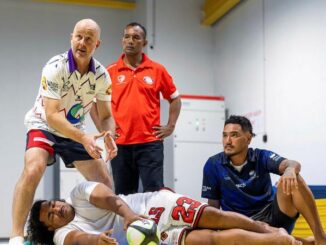The Importance of Qualified Rugby Coaching: Advancing the Future of the Sport
Rugby, a sport known for its raw physicality, strategic depth, and rich history, requires skilled coaching to maintain its dynamic growth and competitive standards. The development of rugby players at all levels—whether amateur or professional—depends significantly on the quality of coaching they receive. As rugby has become more professionalized, the demand for well-trained, knowledgeable, and qualified coaches has increased. These coaches are instrumental in shaping the future of the sport, ensuring that players not only develop their technical and tactical abilities but also understand the game’s underlying principles.
This article delves into the importance of rugby coaching qualifications, the evolution of coaching education, and the value of qualified coaches in the development of rugby players, clubs, and nations. We will also explore how various rugby unions and organizations worldwide are fostering the next generation of coaching talent to improve the overall quality of the sport.
**The Evolution of Rugby Coaching Education**
Coaching in rugby has come a long way from the early days of the sport. Initially, rugby coaches were often former players who simply passed on their own experience to younger generations. However, as rugby evolved into a more structured and professional sport, the need for specialized knowledge in areas such as sports science, psychology, fitness, nutrition, and tactical analysis became clear. This shift led to the creation of formal coaching qualifications and certification programs.
The first significant step in the formalization of rugby coaching education occurred in the late 20th century. Rugby unions across the globe began to establish coaching frameworks to ensure that coaches had the necessary skills to develop players effectively. One of the most prominent of these frameworks was the Rugby Football Union (RFU) Coaching Pathway in England, which began offering structured qualifications to coaches at various levels.
In addition to national bodies, global governing bodies such as World Rugby (formerly the International Rugby Board) have played a crucial role in developing a unified coaching certification system. World Rugby now offers coaching courses and materials that are aligned with the needs of modern rugby, covering topics ranging from basic skill development to advanced game strategy. These programs aim to ensure that coaches are well-equipped to train athletes at any level and can bring out the best in their players, both technically and mentally.
**Coaching Qualifications: The Path to Becoming a Qualified Coach**
A key element of rugby coaching education is the certification process. Rugby coaching qualifications are structured into levels, with each level focusing on progressively more advanced coaching techniques and knowledge. These levels typically include courses that are a combination of theoretical and practical modules, allowing coaches to gain hands-on experience as well as deepen their understanding of the sport.
**Level 1: Introduction to Coaching**
At the entry-level, coaches are introduced to the basic principles of rugby coaching. This level is designed for those who are new to coaching and provides a foundation in key skills such as understanding the rules of rugby, developing basic techniques, and teaching simple drills to players. Level 1 coaches are often responsible for grassroots or youth development, where they play a critical role in introducing young players to the sport and ensuring they enjoy a positive experience.
**Level 2: Intermediate Coaching**
Level 2 coaching focuses on developing a coach’s ability to lead teams and prepare them for competitive rugby. Coaches at this level are expected to have a deeper understanding of the game’s tactical elements, including team formations, set-piece plays, and game strategies. They are also introduced to the psychological aspects of coaching, such as motivation, player welfare, and building team culture. At this level, coaches are expected to manage small squads and help players improve their individual skills while teaching them how to work as a cohesive unit.
**Level 3: Advanced Coaching**
Level 3 coaching is for those who wish to coach at a high competitive level, such as senior club rugby, school teams, or elite youth programs. At this stage, coaches develop an in-depth knowledge of advanced game tactics, player conditioning, and the use of video analysis and other technology to enhance performance. Coaches learn how to analyze both their own team’s performance and that of their opponents, making strategic adjustments accordingly.
At this stage, coaches are often required to work with assistant coaches and to manage more complex coaching environments. Many elite coaches start at this level before moving into higher levels of professional rugby.
**Level 4: High-Performance Coaching**
The pinnacle of coaching education is Level 4, which is reserved for those aiming to coach at the professional or international level. Coaches at this stage need to demonstrate exceptional knowledge of the game, from the highest tactical and technical aspects to psychological preparation, fitness, and player management. Level 4 courses often cover leadership skills, team dynamics, and how to create a high-performance culture within a squad. This level is often undertaken by coaches looking to work in top-tier professional environments, including national teams, Super Rugby franchises, or high-level club sides.
World Rugby’s Coaching Framework provides a structured pathway for coaches to progress from grassroots to elite levels. Each qualification level includes both theoretical components—such as understanding player development, technical skills, and game analysis—and practical elements, where coaches learn how to apply these concepts in real-world settings.
**The Role of Qualified Coaches in Player Development**
Qualified coaches play a pivotal role in shaping the careers of rugby players. At every level, from school teams to professional franchises, coaches are responsible for honing the skills of their players and preparing them to perform at their best. Qualified coaches provide the technical instruction that players need to excel in skills such as passing, tackling, rucking, and scrummaging. They also help players understand the tactical and strategic dimensions of the game, ensuring that they are prepared for the demands of competitive rugby.
One of the primary benefits of qualified coaching is that it allows for a more structured, focused approach to player development. Coaches who are well-trained in how to design training sessions, plan long-term player development, and create progression pathways can help players reach their full potential. Through a combination of drills, fitness sessions, and game-based practices, qualified coaches ensure that players develop a comprehensive understanding of the sport.
Qualified coaches are also essential for promoting safety within the game. Rugby is a contact sport, and it comes with a higher risk of injury compared to other sports. Coaches with the proper qualifications are trained to teach proper techniques that minimize the risk of injury, particularly in areas such as tackling and scrummaging. Furthermore, they play a vital role in managing player well-being by ensuring proper rest, recovery, and fitness regimens are adhered to.
### **International Rugby Coaching Standards and Initiatives**
To ensure the highest standards of coaching across the globe, World Rugby has implemented several initiatives designed to help develop coaches in emerging and established rugby nations alike. These initiatives provide support through coaching courses, resources, and partnerships with national unions.
For example, the **World Rugby Coach Education Program** is an extensive global initiative designed to raise the standards of coaching at all levels of the game. This program includes a range of resources, from online learning materials to in-person courses led by certified experts. Through this initiative, World Rugby seeks to expand its coaching infrastructure, particularly in countries where rugby is still growing, while ensuring that the sport’s global community benefits from a more knowledgeable and skilled coaching workforce.
World Rugby also promotes the **Women’s Coaching Pathway**, which has gained traction in recent years as women’s rugby continues to grow in popularity and stature. By focusing on the development of female coaches, World Rugby is addressing the gender disparity in coaching and encouraging more women to take up coaching roles at all levels.
Another initiative led by World Rugby is the **Regional Rugby Coaching Program**, which focuses on delivering rugby coaching courses to coaches in countries where rugby is still developing. These regional programs are designed to cater to local needs and help coaches build better skills while also fostering a greater appreciation for the nuances of the sport. This initiative is particularly impactful in developing nations, where rugby unions often have limited resources to invest in coach development.
**The Impact of Qualified Coaches on Rugby at the Grassroots Level**
While professional rugby often garners the most attention, grassroots rugby is the backbone of the sport. It is at this level that many of the sport’s future stars are discovered and nurtured. Coaches at the grassroots level not only teach the fundamental skills of rugby but also instill values such as teamwork, discipline, and respect for the game.
Qualified grassroots coaches are crucial to creating an environment where young players feel supported, motivated, and inspired to continue playing. These coaches help develop the skills and understanding needed to succeed in the sport while also ensuring that young athletes experience the joy and camaraderie that rugby brings. Moreover, by fostering inclusive, safe, and positive environments, these coaches can help expand the sport to reach more diverse communities.
At the grassroots level, rugby is often more than just a game; it is a community builder. Qualified coaches play a key role in this by developing a culture of inclusivity, teaching values that extend beyond the field of play, and encouraging fair play and sportsmanship.
**Conclusion**
Qualified rugby coaches are vital to the development and progression of the sport at all levels, from grassroots to the elite. With the continued professionalization of rugby and the growing demand for high-quality coaching, the importance of coaching qualifications cannot be overstated. These qualifications ensure that coaches possess the knowledge and skills necessary to help players reach their full potential, both as athletes and as individuals.
Rugby unions, national governing bodies, and international organizations like World Rugby are playing a critical role in shaping the future of rugby coaching by offering structured coaching pathways, promoting education, and creating opportunities for coaches worldwide. As the sport continues to evolve, the role of the coach will only become more integral to the success and sustainability of rugby at all levels. By investing in coaching education and supporting the development of qualified coaches, we can ensure that rugby remains a dynamic, exciting, and inclusive sport for generations to come.



Be the first to comment